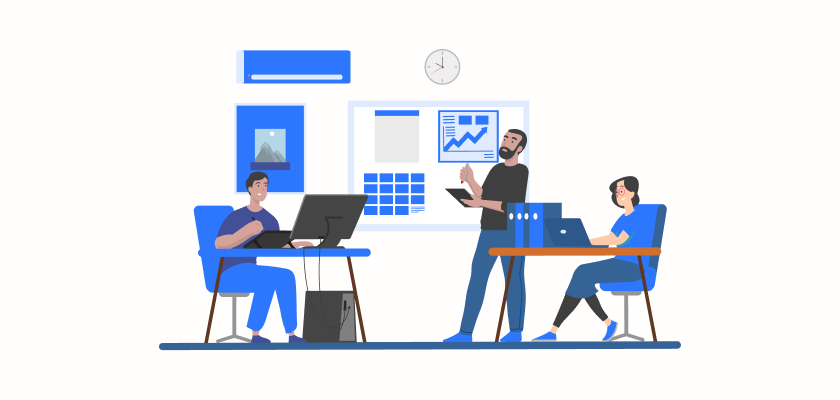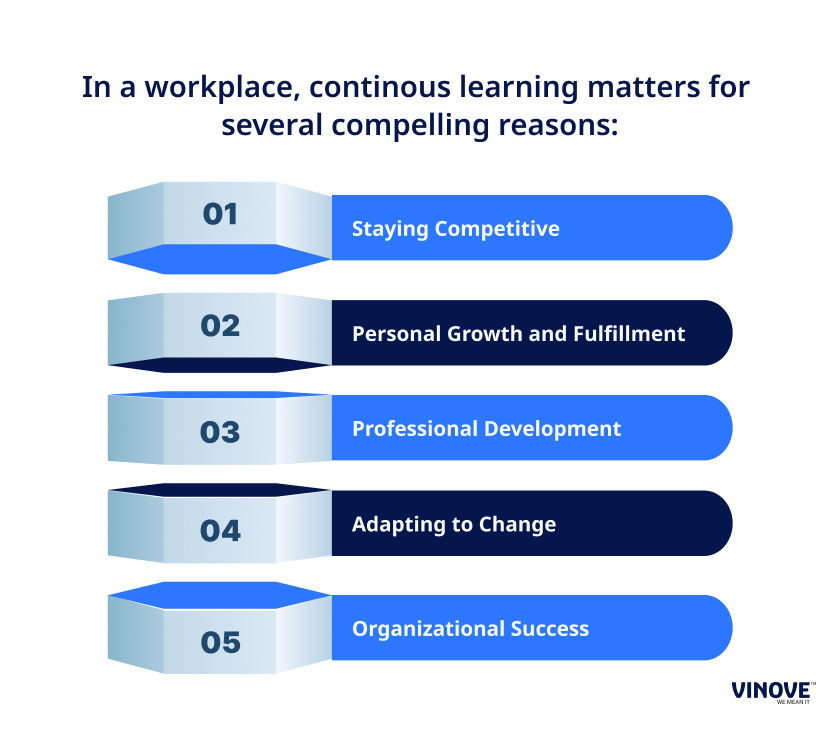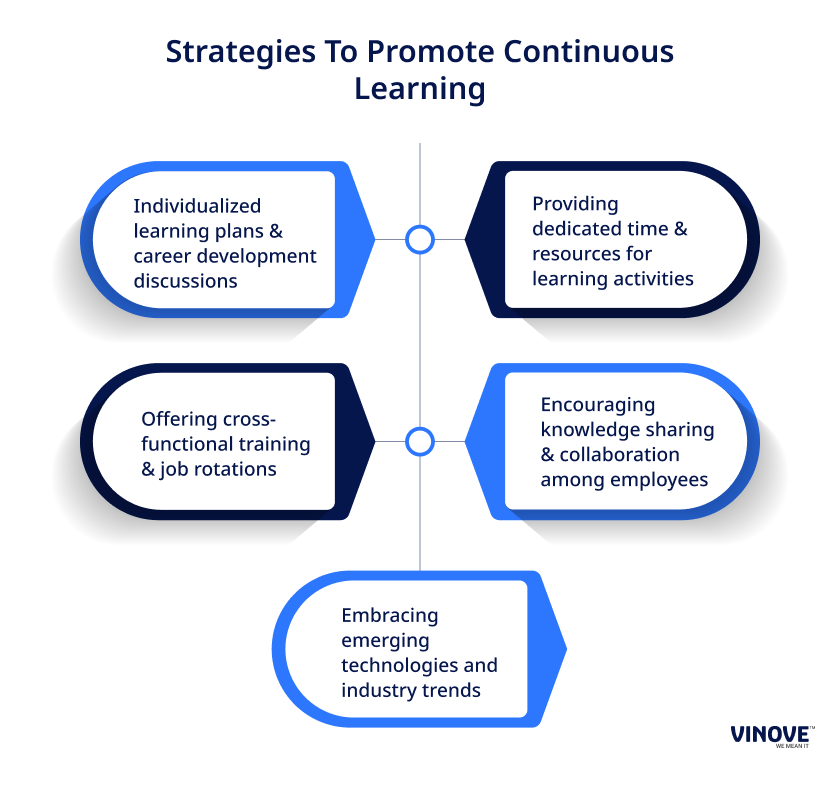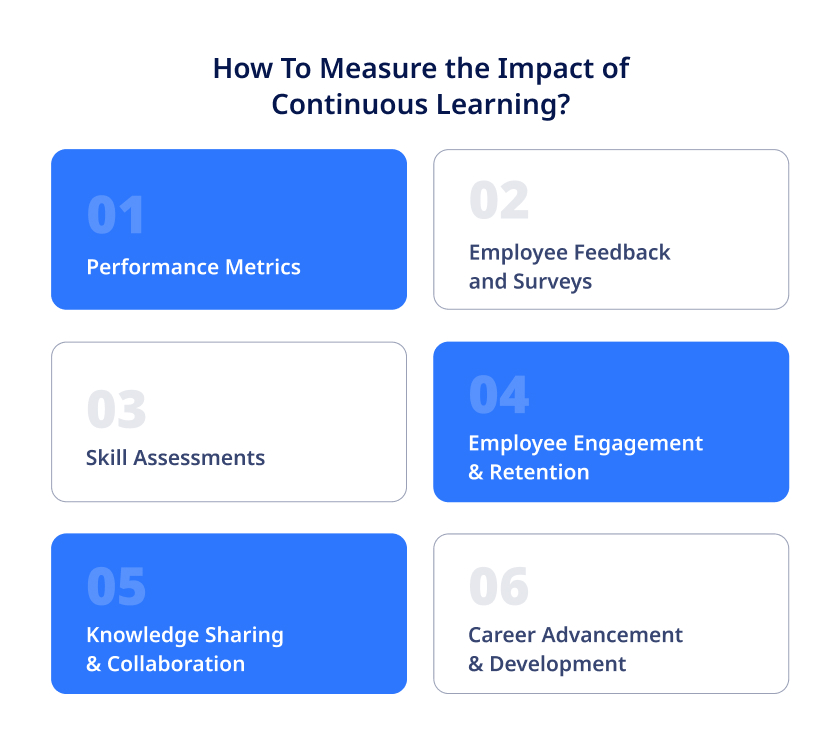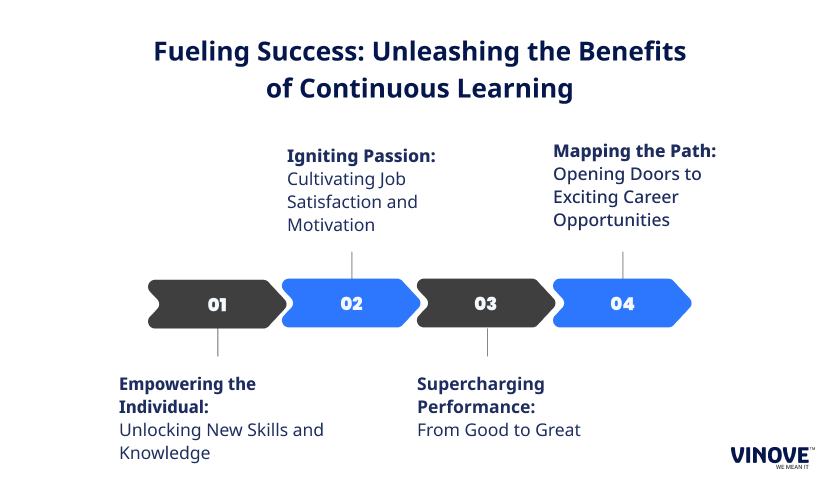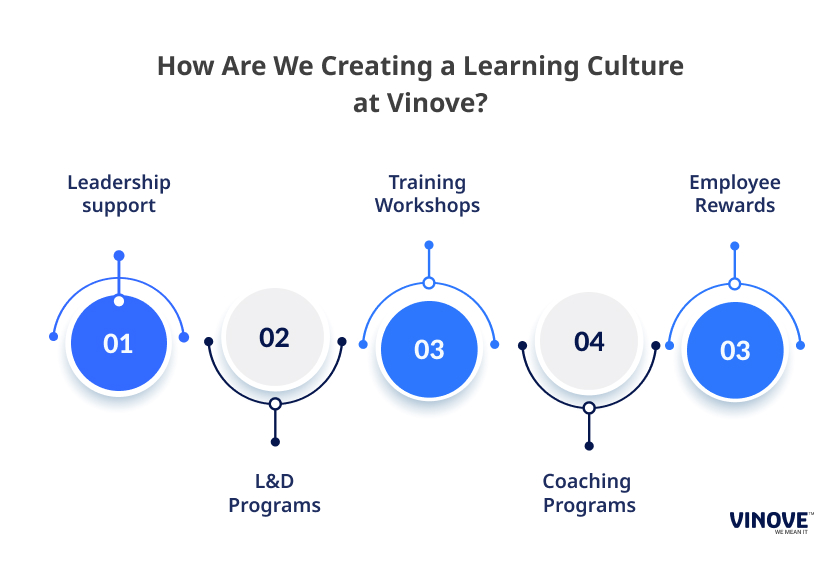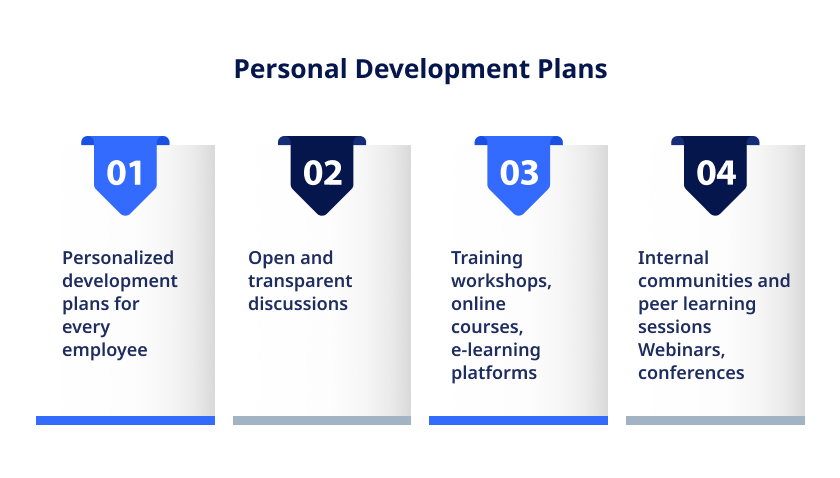Do you ever feel like you are falling behind in today’s fast-paced world?
The quest for professional growth and development can often feel like an uphill battle in today’s time.
As employees, we yearn for opportunities that keep us relevant and ignite our passion for learning. And as organizations, we strive to cultivate a workforce equipped with the knowledge and skills to tackle any challenge that comes our way.
So, it’s the right time to unlock the potential of continuous learning.
In this blog, you will embark on a journey to explore how embracing a culture of ongoing development is empowering the professionals at Vinove. You will also discover how continuous learning can revolutionize the way we work and thrive in today’s ever-changing landscape.
Let’s Understand What Is Continuous Learning & How It Matters In The Workplace
Continuous learning is no longer a luxury; it has become necessary in our rapidly changing world. It empowers individuals to grow personally and professionally, adapt to new challenges, and contribute to the success of organizations.
It is an ongoing process of acquiring knowledge, skills, and competencies throughout one’s lifetime. Continuous learning goes beyond formal education and embraces a mindset of growth and adaptability.
In a world driven by technological advancements and rapid changes, continuous learning enables individuals to stay relevant, enhance their capabilities, and navigate the challenges of a dynamic work environment.
At Vinove, continuous learning matters for several compelling reasons:
Staying Competitive: Continuous learning empowers individuals to stay ahead of industry trends, acquire new expertise, and adapt to emerging technologies.
Personal Growth and Fulfillment: It allows individuals to explore their passions, cultivate new interests, and unlock their full potential.
Professional Development: Continuous learning broadens your perspectives, enhances critical thinking abilities, and encourages innovative problem-solving.
Adapting to Change: It cultivates curiosity, flexibility, and an open mindset to embrace and navigate change effectively.
Organizational Success: Organizations create a skilled and adaptable workforce by encouraging employees to engage in ongoing development.
Strategies To Promote Continuous Learning
At Vinove, we feel that organizations play a crucial role in creating an environment that encourages and supports ongoing development.
Here are some of our effective strategies to promote continuous learning:
A. Individualized learning plans & career development discussions
We establish individualized learning plans to promote growth opportunities. This is done by organizing career development discussions to identify goals, aspirations, and areas for improvement of our people.
By tailoring learning opportunities to their specific needs and interests, employees are more motivated to engage in continuous learning. These discussions also provide a platform for mentorship and guidance, ensuring that employees receive the necessary support to achieve their professional growth objectives.
B. Providing dedicated time & resources for learning activities
Organizations should allocate dedicated time and resources for learning activities to foster a culture of continuous learning. This includes designated “learning days” or allowing employees to dedicate a portion of their workweek to educational pursuits.
We provide our people with access to online learning platforms, educational materials, and relevant resources to engage them in self-directed learning.
C. Offering cross-functional training & job rotations
Cross-functional training and job rotations are our key strategies for promoting continuous learning. By exposing employees to different roles, departments, or projects within the organization, they gain a broader understanding of the business and develop new skills.
This cross-pollination of knowledge enhances their versatility and adaptability, fostering continuous growth. Additionally, it encourages employees to step out of their comfort zones, explore new challenges, and expand their capabilities.
D. Encouraging knowledge sharing & collaboration among employees
Creating a culture of knowledge-sharing and collaboration is essential for continuous learning. Organizations can facilitate this by implementing platforms or tools that enable employees to share expertise, insights, and best practices.
Encouraging collaborative projects, team-based problem-solving, and regular knowledge-sharing sessions fosters a dynamic learning environment. When employees can learn from one another, leverage collective intelligence, and engage in constructive discussions, it enhances their learning experience and promotes a culture of continuous improvement.
E. Embracing emerging technologies and industry trends
Organizations must embrace emerging technologies and industry trends to stay ahead in today’s rapidly evolving landscape. This includes providing opportunities for employees to earn and adapt to new technologies relevant to their roles.
We offer training programs, workshops, or courses on emerging trends to equip employees with the necessary skills to remain competitive. By aligning learning initiatives with industry advancements, organizations can empower employees to stay at the forefront of their fields and adapt to the market’s changing needs.
How To Measure the Impact of Continuous Learning?
It is essential to employ appropriate measurement methods to assess the effectiveness and impact of continuous learning initiatives in the workplace.
Here are some ways to measure the impact of continuous learning:
Performance Metrics
One way to gauge the impact of continuous learning is by tracking performance metrics. Compare key performance indicators before and after implementing learning programs or initiatives.
This includes metrics such as:
- Productivity
- Quality of work
- Customer satisfaction
- Sales performance
Employee Feedback and Surveys
Collecting employee feedback through surveys, focus groups, or interviews provides valuable insights into the impact of continuous learning.
- Ask employees about their perception of the learning opportunities provided
- How it has influenced their skill development, job satisfaction, and career progression
Analyzing this feedback helps gauge the perceived impact and identify areas for improvement.
Skill Assessments
Conduct regular skill assessments or competency evaluations to measure the impact of continuous learning. This can be conducted before and after learning initiatives to identify specific skills or competencies improvements.
This helps quantify the impact of learning programs on employee capabilities and can provide valuable data for tracking progress over time.
Employee Engagement & Retention
Higher employee engagement and retention rates are indicators of the impact of continuous learning. Engaged employees are more likely to participate in learning activities, apply new knowledge and skills, and contribute to organizational success.
Hence, monitor employee engagement levels through surveys or other feedback mechanisms, and analyze retention rates to identify any correlation with continuous learning efforts.
Knowledge Sharing & Collaboration
Measure the impact of continuous learning by assessing the level of knowledge sharing and collaboration within the organization. You must track the following things:
- Frequency and quality of knowledge exchange among employees
- Participation in collaborative projects
- The adoption of new ideas or practices
Increased knowledge sharing and collaboration indicate that continuous learning initiatives foster a learning and innovation culture.
Career Advancement & Development
Monitor the career progression and development of employees to measure the impact of continuous learning. For this,
- Must track promotions, lateral moves, or expanded responsibilities within the organization.
- Conduct surveys or interviews to understand employees’ perceptions.
Fueling Success: Unleashing the Benefits of Continuous Learning
- Empowering the Individual: Unlocking New Skills and Knowledge
Continuous learning provides opportunities to expand existing competencies and acquire fresh insights, enabling individuals to stay relevant in a rapidly evolving world.
As individuals learn and grow, they become more confident in their abilities, increasing job satisfaction and a sense of personal fulfillment.
- Igniting Passion: Cultivating Job Satisfaction and Motivation
Continuous learning cultivates job satisfaction and motivation by igniting passion in individuals.
Acquiring new knowledge and skills opens doors to exciting possibilities and enhances their ability to contribute meaningfully to their roles and the organization.
- Supercharging Performance: From Good to Great
Individuals can enhance their problem-solving, critical thinking, and decision-making prowess by constantly acquiring new insights and staying updated on industry trends.
This leads to improved performance and outcomes, positively impacting personal growth and organizational success.
- Mapping the Path: Opening Doors to Exciting Career Opportunities
Individuals become more versatile and adaptable, positioning themselves for growth and advancement by expanding their skill set and knowledge base.
Continuous learners are more likely to be considered for challenging projects, promotions, or leadership roles, thus shaping their professional trajectory.
How Are We Creating a Learning Culture at Vinove?
We at Vinove continuously encourage our employees through various professional & skill development programs. We foster a culture of continuous learning, enabling our employees to thrive, grow professionally, and contribute to the overall success of our organization. Here is a detailed view of our company’s learning culture:
A. Leadership support and commitment
Our leaders understand the value of continuous learning and actively promote it throughout the organization. They lead by example, demonstrating their commitment to learning and encouraging employees to embrace a growth mindset.
B. Establishing learning and development programs
We have established comprehensive learning and development programs at Vinove. These programs encompass various initiatives aimed at enhancing employees’ skills and knowledge:
1. Training workshops and seminars
We organize regular training workshops and seminars covering various topics relevant to our employees’ professional growth. These sessions are led by industry experts and internal subject matter specialists, providing valuable insights and practical knowledge.
2. Online courses and e-learning platforms
We provide access to various online courses and e-learning platforms, allowing employees to learn at their own pace and convenience. These platforms offer diverse courses, enabling employees to acquire new skills and stay updated with the latest industry trends.
3. Mentoring and coaching programs
Our experienced mentors provide guidance, share expertise, and help employees navigate their careers. Coaching programs focus on specific skill development areas, providing personalized support and feedback.
C. Encouraging self-directed learning & personal growth
We encourage self-directed learning by providing resources, such as books, articles, and research materials, that employees can explore at their own pace.
Additionally, we promote continuous improvement through self-assessment tools and encourage employees to set learning goals.
D. Recognizing and rewarding employees’ learning achievements
We celebrate employees’ commitment to learning and acknowledge their accomplishments. This includes public recognition, certificates of achievement, or career development opportunities.
By valuing and rewarding continuous learning, we motivate employees to participate in our learning culture actively.
Personal Development Plans
Personal development plans are strategic frameworks that outline an individual’s goals, aspirations, and actions for continuous learning and growth. PDPs provide a structured approach to identify areas for improvement, set specific learning objectives, and outline the steps needed to achieve them.
At Vinove, we recognize the significance of PDPs in supporting employees’ continuous learning journeys.
- We collaborate closely with our employees to create personalized development plans tailored to their unique needs and aspirations.
- This collaborative process involves open and transparent discussions between employees and their managers.
- We offer a range of resources and initiatives to support employees in achieving their development goals.
- We provide access to training workshops, online courses, and e-learning platforms that cover various technical and soft skill areas.
- We encourage employees to attend industry conferences, seminars, and webinars to stay updated with emerging trends and technologies.
- We promote knowledge sharing and collaboration through internal communities of practice and peer learning sessions.
- We recognize the importance of providing constructive feedback and performance evaluations to employees.
Demonstrating the positive impact on individual and company success
The success stories of employees at Vinove demonstrate the positive impact of continuous learning on both individual growth and company success.
Here are some key highlights:
- Enhanced Employee Skills
Continuous learning initiatives at Vinove have resulted in employees acquiring new skills, expanding their knowledge base, and stay updated with the latest industry trends.
- Improved Job Satisfaction and Motivation
Vinove demonstrates its commitment to employee growth, fostering a positive work environment by investing in their professional development.
- Employee Retention and Loyalty
Employees with opportunities for growth and advancement are more likely to stay with the company for the long term, reducing turnover and retaining valuable talent.
- High-Quality Deliverables
The positive impact of continuous learning is reflected in the high-quality deliverables produced by Vinove’s employees. This, in turn, enhances customer satisfaction and strengthens the company’s reputation.
Conclusion
Continuous learning holds immense benefits for both employees and employers. It catalyzes personal and professional growth as it enables individuals to navigate the intricacies of a rapidly evolving landscape. Organizations should offer diverse resources and growth opportunities to promote continuous learning effectively. This includes providing training programs, workshops, conferences, and mentorship programs.
Hence, continuous learning should be regarded as an investment in the future prosperity of both employees and organizations. At Vinove, we help our colleagues develop and nurture healthy client relationships. As a leading software development company in India, we provide high-quality services to clients worldwide with 97% client retention. Contact us today!

